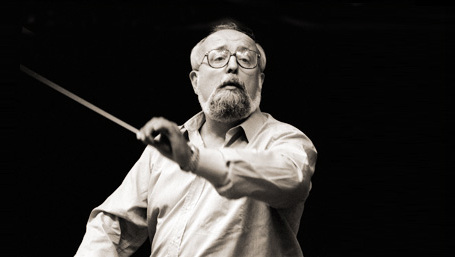
photo - PR
The programme for the final concert of the week-long festival in his tribute, at the National Opera in Warsaw, features his orchestral, choral and chamber music spanning more than five decades of his career, from Threnody to the Victims of Hiroshima (1960) to Duo Concertante for violin and double-bass (2011).
Credo for chorus (1998) and Concerto Grosso for 3 cellos and orchestra (2001) with the Sinfonia Varsovia and the Warsaw Philharmonic Choir will also be performed, conducted by Valery Gergiev, Charles Dutoit and Krzysztof Urbański.
Even after a long career - which recently included working with Radiohead's Jonny Greenwood when they played a rock festival - Penderecki is still very much a working composer, with his new piece, La Follia for solo violin, having its première at New York’s Carnegie Hall on 14 December, where it will be performed by Anne Sophie Mutter.
Two passions
Penderecki describes himself as a man of two passions, for music and gardens. He has planted and grown several hundred species of trees and bushes at his estate in Lusławice, southern Poland.
In the festival programme book he writes: "No artistic activity can survive without roots. Let’s look at a tree: it teaches us that a work of art must take root in two things: the ground and sky, and that the most sublime and fundamental values are always the key."
Born in Dębica on 23 November 1933, Penderecki studied composition with Artur Malawski at the State Higher School of Music in Kraków. Earlier he took lessons from Franciszek Skołyszewski.
In 1959 three of his works (Strophes, Emanations and Psalms of David) won him the three top prizes at the Young Composers’ Competition of the Polish Composers’ Union (each piece was submitted anonymously).
His international position was consolidated in the 1960s thanks to pieces such as Threnody for the Victims of Hiroshima, St Luke Passion and Dies irae.
From avant-garde to romantic
Penderecki’s music evolved from the experimental, sonoristic works in which he employed unconventional articulation techniques in the strings, to pieces inspired by the late-Romantic style.
Examples of the former are the Threnody for the Victims of Hiroshima, String Quartet No. 1, and Polymorphia (1966).
Starting with the monumental St Luke Passion (1966), which skyrocketed Penderecki to worldwide fame, the composer broke with the radicalism of the avant-garde and turned back to tradition.
This was manifested in large-scale vocal-instrumental works such as Utrenya (1970-71), Cosmogony (1970) and Magnificat (1974).
In the 1970s Penderecki moved towards the late-Romantic tradition. The best examples of that period are the Violin Concerto (1977), the opera Paradise Lost (1978), Symphony No. 2 ‘Christmas’ (1980), Te Deum (1980) and Polish Requiem (1980-84).
Penderecki also drew on 20th-century expressionism (the opera Die schwarze Maske, based on a play by Gerhart Hauptmann (1984-86), for example.
His output also includes two cello concertos, Awakening of Jacob, the opera Ubu-Rex, Seven Gates of Jerusalem, Piano Concerto ‘Resurrection’, Kaddish and A sea of dreams did breathe on me’.
Penderecki’s long list of honours and distinctions includes the Gottfried von Herder Award, the Sibelius Prize, and Grammy Awards, as well as honorary doctorates from twenty four music academies and universities. (mk/pg)
Listen to a tribute to Krzysztof Penderecki in a special edition of our culture magazine Focus, hosted by Michal Kubicki.